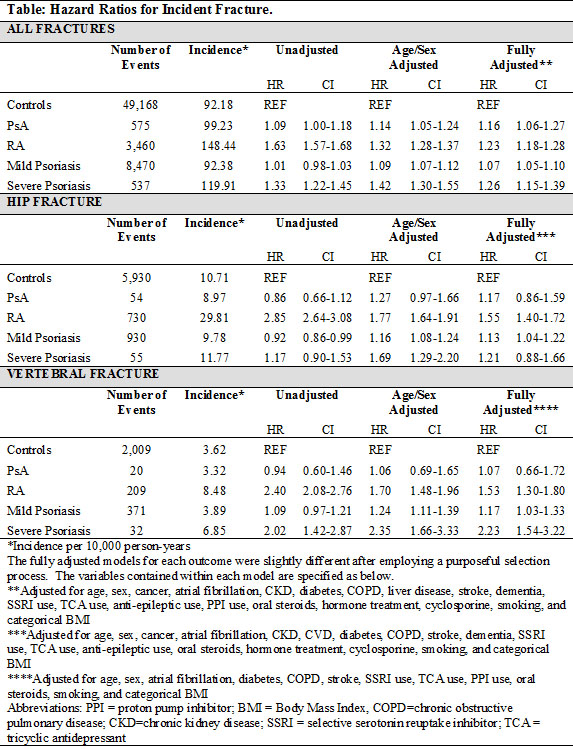Session Information
Session Type: ACR Poster Session B
Session Time: 9:00AM-11:00AM
Background/Purpose: While rheumatoid arthritis (RA) has been linked to an increased incidence of osteoporosis (OP) and fracture, few studies have examined the risk of fracture associated with psoriasis and psoriatic arthritis (PsA). In this study, we determined the risk of fracture among patients with PsA, psoriasis and RA compared with the general population.
Methods: A longitudinal cohort study was conducted in The Health Improvement Network (THIN), a primary care medical record database in the United Kingdom, to determine the risk of fracture (all, hip, and vertebral) using data from 1994-2014. Patients aged 18-89 with a diagnosis of PsA, RA, or psoriasis were selected. Diagnosis codes for PsA, RA, and psoriasis have been validated in THIN. Up to 5 unexposed controls matched on practice and start date within the practice were selected for each exposed patient. Cox proportional hazards models were used to calculate the adjusted hazard ratios (aHR) for each outcome. Multivariable models were constructed to include known risk factors and potential confounders (p-value<0.05 and changed the main effects by >10%).
Results: Patients with PsA (N=9,788), RA (N=39,306), psoriasis (N=158,323) and unexposed controls (N=821,834) were identified. Patients with RA had a significantly elevated risk of fracture: all, hip, and vertebral aHR: 1.23 (1.18-1.28), 1.55 (1.40-1.72), 1.53 (1.30-1.80) respectively. Those with mild psoriasis had significantly elevated risk of all fractures and hip fracture: aHR 1.07 (1.05-1.10) and 1.13 (1.04-1.22). Patients with severe psoriasis had significantly elevated risk of all fracture and vertebral fracture: aHR 1.26 (1.15-1.39) and 2.23 (1.03-1.33). Patients with PsA had a significantly elevated risk of all fracture: aHR 1.26 (1.06-1.27). Patients with PsA had an elevated aHR for hip fracture (1.17; 0.86-1.59), however, this was not statistically significant. These results were robust to several sensitivity analyses.
Conclusion: Patients with PsA, severe psoriasis and RA have an elevated risk for fracture. These results underscore the importance of screening for osteoporosis among patients with these inflammatory conditions.
To cite this abstract in AMA style:
Harter L, Shin D, Baker JF, Takeshita J, Love T, Gelfand J, Ogdie A. The Risk of Fracture Among Patients with Psoriasis, Psoriatic Arthritis and Rheumatoid Arthritis [abstract]. Arthritis Rheumatol. 2016; 68 (suppl 10). https://acrabstracts.org/abstract/the-risk-of-fracture-among-patients-with-psoriasis-psoriatic-arthritis-and-rheumatoid-arthritis/. Accessed .« Back to 2016 ACR/ARHP Annual Meeting
ACR Meeting Abstracts - https://acrabstracts.org/abstract/the-risk-of-fracture-among-patients-with-psoriasis-psoriatic-arthritis-and-rheumatoid-arthritis/

